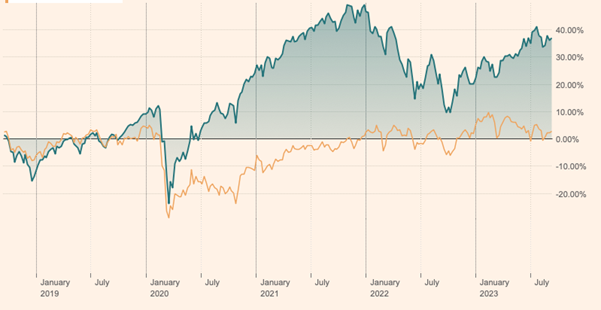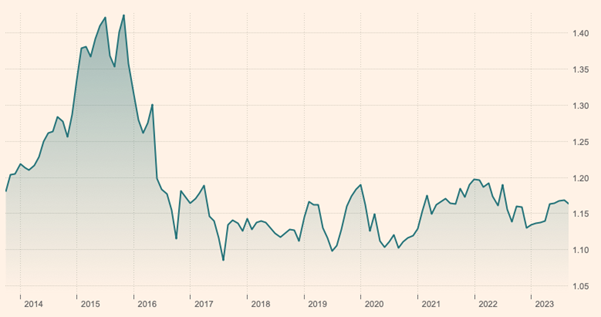Pound Land: what does a weak sterling mean for your wealth?
Sterling is weak – and has been for some time. While this is unlikely to be a source of national pride, it does bring some benefits to anyone investing sterling into a portfolio of international companies.
Diversify your shores
Evidence suggests that diversifying your portfolio beyond these shores makes sense.
A quick look at the five-year chart below[1] – which compares the MSCI World Price Index USD End of Day Index versus the FTSE 100 – is as good an example as any.

But going global starts to introduce currency risk. If your investment returns are in multiple currencies but your outgoings and liabilities are in sterling, there’s a potential mismatch – and this can become exacerbated when the pound sits at historic lows.
Common currency
While business owners with international interests will know the accretive or dilutive effects of currency movements – many of us tend to think only of the issue when we’re on holiday.
Yet any changes to a currency’s relative value have broader implications for your wealth. This is because exchange rate movements can change the performance of an international investment, denominated in a currency different to the one used to make the investment in the first place.
Some of the key influences are low inflation (a country with a lower rate tends to have a currency with greater purchasing power); high interest rates (better returns on domestic capital can attract international capital, boosting the domestic currency); and political stability (foreign investment usually flows towards solid or growing economies).
Whither sterling?
How does the UK stack up against such measures?
This year, sterling has done fairly well. A return of some competence to the central government has helped it perform admirably against the dollar, euro and yen. Nine months gains of 2.7%, 1.6% and 11.0% show comparative strength and stability against bigger economic blocs.[2]
And yet … shocks like the Truss debacle, Brexit and the financial crisis – plus a backdrop of high inflation, low growth and poor economic fundamentals – all help to paint a slightly darker picture over the long run.
Ten years is a good period over which to assess performance. Since 1 October 2013, sterling fell 22.8% and 3.3% against dollar and euro. It rose 15.8% against the troubled yen[3].

UK Pound Sterling/Euro FX Cross Rate, 1 October 2013 to 1 September 2023[4]
It would be difficult to argue the UK’s currency is in a good place.
Sterling and global investing
In a globalised economy, so much of what we invest in has a global dimension. Even if you were to track the performance of the FTSE100 index, returns would be driven by mainly overseas earnings – about 82% according to a recent analysis[5].
So, for anyone placing money into the UK’s flagship index, they would benefit from the fact that overseas revenues and profits are arithmetically worth more when the sterling languishes.
If we return to the implications for UK investors placing money globally, it’s worth remembering the ubiquity of the dollar.
Many indices of global companies are priced in dollars. The index pictured above, the MSCI World Price Index, is a good example/
Moreover, many of the commodities that play such a huge role in global investing – from oil to coffee – are priced in dollars. Here, a weak sterling versus the dollar raises the price of such commodities for those building wealth in sterling. For example, UK chemical or packaging companies will be facing a higher price for the oil they need, which can eat into profits, unless they pass it onto customers in the form of higher prices.
Some good news
It’s clear that currencies can be complex – but at First Wealth, where much of the money we manage for you will be globally diversified, we like to focus on simple, evidence-based investments.
And the evidence tends to say several helpful things when the pound is weak.
Firstly, as we’ve seen above, a strong dollar or euro and a weak pound can combine to boost your investments, simply because you gain more per unit of foreign currency.
Secondly, weakness in sterling tends to make British exports increasingly competitive on international markets.
Thirdly, analysis from a leading index firm, MSCI, says, “currency fluctuations, both in nominal and real terms, seem to have a more important impact on international investments in the short term than in the long term.”
In other words, if you’re investing for a generation or so – as many of our clients do – then currency fluctuations tend not to have a material effect on your wealth building.
In any case, currency is something we consider alongside multiple other factors – from the way we allocate your money across companies to the cost of investing itself.
[1] https://markets.ft.com/data/indices/tearsheet/summary?s=MS-WX:MSI
[2] https://markets.ft.com/data/currencies/tearsheet/charts?s=GBPUSD, https://markets.ft.com/data/currencies/tearsheet/charts?s=GBPEUR and https://markets.ft.com/data/currencies/tearsheet/charts?s=GBPJPY
[3] https://markets.ft.com/data/currencies/tearsheet/charts?s=GBPUSD, https://markets.ft.com/data/currencies/tearsheet/charts?s=GBPEUR and https://markets.ft.com/data/currencies/tearsheet/charts?s=GBPJPY
[4] https://markets.ft.com/data/currencies/tearsheet/charts?s=GBPEUR
[5] https://www.ftserussell.com/blogs/overseas-revenues-boon-ftse-100-performance
This document is marketing material for a retail audience and does not constitute advice or recommendations. Past performance is not a guide to future performance and may not be repeated. The value of investments and the income from them may go down as well as up and investors may not get back the amount originally invested.
Let's Talk
Book a FREE 30-minute Teams call and we’ll answer your questions. No strings attached.
Check Availability




